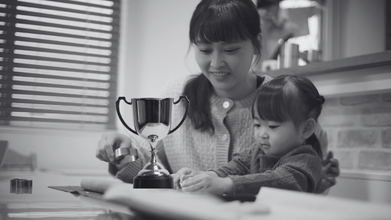- Health Conditions A-Z
- Health & Wellness
- Nutrition
- Fitness
- Health News
- Ayurveda
- Videos
- Medicine A-Z
- Parenting
- Web Stories
What Is The Trophy Child Syndrome That Pressurizes Kids To Be Reflection Of Their Parents' Success?

Credits: Canva
Think of when you go to someone's house who has a kid. What is the first thing that happens? The kid is asked to sing, dance, or recite a poem for the guests. If the kid does it, he or she receives applause, and the parents become instantly happy. If the kid fails to do so or hesitates, while the parents smile, and behind it is a pattern that child psychologist call the Trophy Child Syndrome.
This happens when parents view their child's talents, grades, or charm as the reflection of their own. While this may seem like a common, everyday household, tradition, it bears a lasting impact on the child. This is what experts call the 'showcase parenting'.
What Is A Trophy Child?
Paul Opiyo, who writes for Medium says that when a child is exceptionally good at something his or her success is often put at par with parent's reflection. However, this comes in many shapes, for instance, writes Opiyo, if the child shows great athletic talent, the parents initiate a 'Project Mbappe', or when the child demonstrates intellectual gifts, the parents shove a 'Project Einstein' on them.
In other parents, from very early on the child discovered that it is not them or their personality, but actually what they do is what's considered important.
This is true especially in households with parents who have high narcissistic traits, who are controlling or who are enmeshed. This is where the child is seen just as the extension of a parent and nothing more than that. This forms predictable patterns of family dynamics. The family operates on winning love and approbation. This is not just a competition, but a habit, that gets amped up and becomes the standard by which family members are judged.
Are There Signs Of A Trophy Child?
While the child may recognize that he or she is a trophy child, there could be many signs that may hint towards those.
Perfectionism
The child has a strong need to be perfect at everything they do. The child is also highly sensitive to criticism, because any mistake to the child feels like a failure to meet expectations.
People Pleasing
The child has a hard time saying 'no', this is because the child has had a habit of seeking validation from others.
External Validation
The child's self worth is also tied to their accomplishments and achievements, which are only celebrated outside, and not private goals. The child learns to feel valuable only when there is something that the child is 'winning' at.
Loss Of Identity
In the race to become someone else or to behave like someone else, personal goals or the child's own interests often gets sidelined. this could lead to a weak sense of self.
Experts point out that these kids internalize the message that they are valued for what they do and not who they are. This very feeling creates deep insecurities in them as they enter adulthood. Because even after they have grown up, they feel the constant pressure to prove their worth.
Experts also point out that social media has further fueled fire to this. Thanks to social media, many parents are asking their kids to do certain things, record it online and upload it for likes and views.
However, there is a way to break the cycle, the first step is to acknowledge that this is happening with you and then to approach a practitioner.
Study Shows THIS Is What Parents Should Do In The First 1000 Days Of A Child's Birth To Prevent Childhood Obesity

(Credit-Canva)
Childhood obesity is a growing global health problem. According to the World Health Organization, in 2024, 35 million children under the age of five were overweight. While many parents ignore the issue, assuming children will lose weight as they grow, childhood obesity is linked to numerous adulthood problems, including a higher risk of heart disease and hypertension.
However, how much of the fault lies in the children, is it just because of their diet and willingness to stay active?
A new and significant study by a European research group, the EndObesity Consortium, has made a surprising discovery: they think this health crisis might actually start even before a baby is even conceived. This group of scientists has been searching for new and effective ways to stop the rising number of children who are becoming obese.
What Role Does Parenting Play in Childhood Obesity?
The study identified a critical period called the “first 1,000 days,” which it says is the most important window to prevent childhood obesity. The scientists, whose work was published in the Pediatric Obesity journal, explain that this key window begins before the child is conceived and lasts until the child turns two years old.
The researchers found that the health programs currently used to fight obesity by changing people's habits are usually put into place too late. Also, these programs often fail to deal with the social and economic problems that make it hard for people to lose weight. Because of this, the study suggests a much wider plan is needed. This plan would involve both parents making healthy changes before they conceive a child and also include big changes to government policies.
How To Change Your Lifestyle To Beat Obesity?
The researchers are convinced that the period from before conception until the child is two is the absolute best time to focus on stopping obesity. They noted that simply telling people to make lifestyle changes right now hasn't worked well. They argue that we need a solution with many parts. This solution must mix personalized help for families with supportive government rules, which could include things like:
- Regularly checking families for obesity risks.
- Teaching the public more about healthy habits.
- Creating places and rules that make living a healthy life easy right from the start.
What are The Risk Factors Of Childhood Obesity?
This new approach aims to stop the problem of obesity being passed from parents to children. The research team listed several ways the mother's and father's lifestyle before conception could increase the child’s risk of obesity:
- The parent being overweight or obese themselves.
- The mother gaining too much weight during pregnancy.
- Eating a diet that is unhealthy, high in fat, and full of sugar.
- Not getting enough essential vitamins and minerals.
- Not getting enough physical activity or exercise.
- Smoking.
- Having high levels of stress.
Once the baby is born, other things can affect their risk of becoming obese, such as:
- Not breastfeeding or having issues with it.
- Using baby formula that isn't ideal.
- The child gaining weight too fast.
- An unhealthy diet during the first years of life.
- Poor quality sleep.
Do Obese Parents Affect Child’s Health?
Research shows that parental obesity increases the likelihood of children also becoming obese, creating a challenging cycle.
This link happens because adults who carry too much weight have a higher risk of health issues like Type 2 diabetes and heart disease. These conditions can negatively affect the health and quality of a woman's eggs and the environment inside her ovary. This in turn can hurt the earliest development of the fetus, which is how the cycle of obesity risk begins for the next generation.
Study Links Nighttime Phone Usage To Increased Risk Of Suicide In Children

(Credit-Canva)
Suicide attempts and overdose cases are rising among young people across the country. However, what is the cause behind this rise? In a new study, researchers found a concerning link between late-night screen time and these cases.
To find out the link, a research team from the Virginia Tech Carilion School of Medicine, led by Dr. Abhishek Reddy, a child and adolescent psychiatrist, is working to find better ways for families to protect their children before a crisis hits.
The researchers talked to teenagers between 12 and 17 years old who had been hospitalized after intentionally overdosing. Their main goal was to find out the when, how, and why of these dangerous events so that parents, doctors, and schools can step in much sooner.
They looked at three things together: the time of day the overdose happened, the teen's phone or screen use just before, and the type of medicine they took.
How Does Late Night Screen Time Affect Children?
American Academy of Child and Adolescent Psychiatry explains that on an average, children between the age of 8-18 in the US spend 7.5 hours watching or using screens, whether it is to entertain, teach or just to occupy themselves.
The study found very clear patterns. Most overdoses happened late at night, often while the teens were on their phones or computers, or right after. The pills used were a mix of both prescription drugs and simple over-the-counter medicines. This shows that it's the easy access to pills, not just strong ones, that can lead to a suicide attempt.
The researchers realized that late-night hours seem to be when young people feel the most emotional stress. When that feeling is mixed with instant access to social media and medicines readily available at home, the situation becomes very dangerous.
Experts warn that even common pills we think are safe, like pain relievers or allergy medicines, can be deadly in an overdose. Knowing the time and method helps create practical prevention plans that families can actually use. This information backs up national data showing that suspected suicide attempts by poisoning among teens jumped by over 30% recently.
Can Parents Prevent Overdosage In Children?
Even though the findings are serious, they point to things every family can do right away. The researchers suggest three main ways to help prevent overdoses:
- Limit screens late at night.
- Help teens develop good sleep habits.
- Lock up all medicines—both prescription and over-the-counter.
Simple changes can make a huge difference. Parents should set "digital curfews," perhaps by using apps to limit screen time or by making sure phones and tablets stay outside the bedroom after a set hour.
Help kids create a relaxing bedtime routine, like reading a book, to help them sleep better. It is just as important to lock or safely store all medicines, count how many pills are left, and immediately throw away any old or unused pills.
The researchers also stress that talking openly and honestly with your kids is key. Distress late at night, especially after arguments or seeing upsetting content online, can lead to impulsive actions. Checking in with your children about how they are feeling and what's happening in their online life can help defuse those risky moments.
Dr. Reddy said this research gives everyone specific things they can change—things like screen time and medicine storage. This is very valuable because we can move from simply knowing there is a crisis to taking concrete steps to stop it. The team hopes these ideas will lead to new programs focused on digital safety, safe medicine habits, and support for teens in crisis who need help late at night.
The main goal is to use this data to create simple, effective ways to prevent tragedies every day. Since suicide is a leading cause of death for children, and overdoses on easily found pills are common, helping parents focus on these safety measures could save young lives.
Parenting Habits That Creates Struggling Adults, According To Child Psychologist

Credits: Canva
Raising a child is not the easiest job. In fact, everyday feels like a new test. Somedays you would find yourself jumping to finish cleaning your child's toys even when you asked them to do. On other days, you would have a meltdown, but will have to manage to stop it.
But while you do all of these, there may be certain actions that may make your child into a struggling adult.
Child psychologist, and professor Daniel J Moran, of Touro University New York, told Newsweek, "Parents...are working overtime to make their children's lives smooth and happy. The intention is love, [but[ the outcome is often dependency."
This happens when parents remove discomfort from a child's life. The above example of the parent picking up child's toys is one such instance. If one has to apply science into it, children learn confidence by experiencing consequences and discovering that they can handle it. If parents get everything done for them, they will never know if they could handle a certain situation.
Moran says that true resilience comes from "hearing to stay present, feel the hard stuff and keep moving toward what matters."
Three Common Habits And Actions Of Parents That Could Take Away Their Child's Independence And Make Them A Struggling Adult
Fix Instead of Coach: This happens when parents jump in to solve every problem on their own. This teaches the kids that they do not have to work things on their own. Instead of fixing, parents must coach their kids, guide them into solving things.
Overpraising: While appreciating one's effort, especially when a child does something big for the first time is important. However, continuously praising your child on a day to day basis, without having to achieve something new or special could remove the learning value of effort and feedback. For every activity that a child does, praise is not the only feedback, it could also be critical in nature.
Overscheduling: Parents often feel the urge to teach their child everything, especially the things they wanted to learn as kids, but never got to. However, it leaves little room for boredom, which is dangerous, as Moran says that boredom is a place, "where creativity and self direction grow".
So, What Can Parents Do?
Moran says that the parents should let their kids "struggle safely". Parents can also model questions of acceptance of mistakes and ask reflective questions, such as "who do you want to be right now?"
"If we want confident, capable young adults, we have to let kids practice being uncomfortable,” Moran says. "Confidence doesn’t come from constant praise, but comes from persistence, problem-solving and purpose. A little discomfort today can build the psychological flexibility they’ll need tomorrow.”
Dr Samantha Whiten, clinical psychologist, owner of Best Life Behavioral Health tells Newsweek that overhelping often encourages overdependence. " Doing everything for your child when they can physically do things for themselves... trains them to depend on you for everything versus being proud and confident in what they can master on their own,” she says.
So Whiten recommends a steady approach that can build confidence. The first step is to demonstrate the task and let the child try it while you observe. Then leave the room, observe from afar, because you leaving the room would mean that you are confident in your child.
© 2024 Bennett, Coleman & Company Limited

